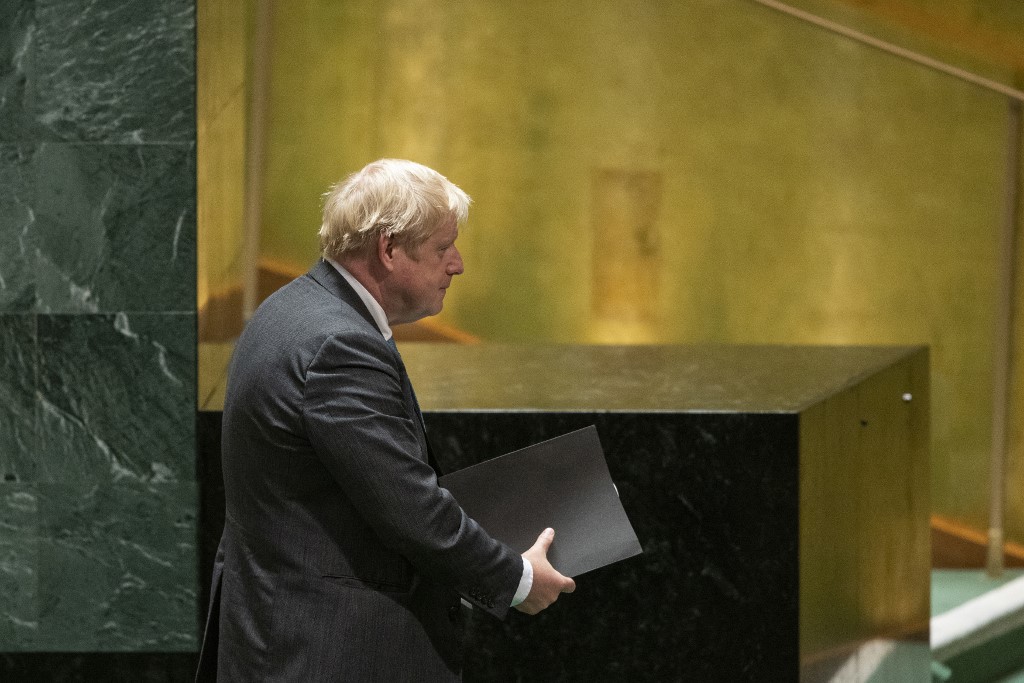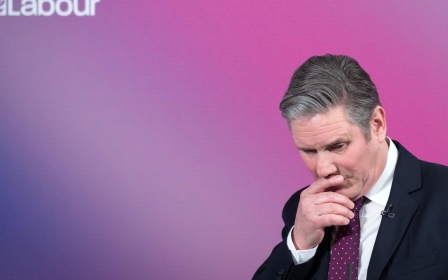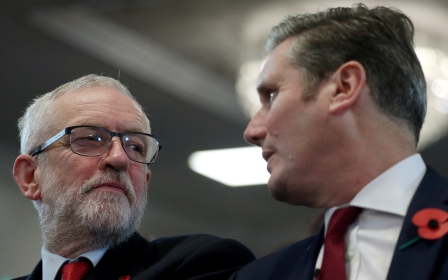Keir Starmer has squandered his opportunity to wage war on the Tories

Very few politicians have ever been presented with such a priceless opportunity as Keir Starmer when he was elected Labour leader last year.
Starmer’s opponent, Boris Johnson, is an amoral Tory prime minister running a corrupt government. Through laziness and incompetence, Johnson grossly mishandled the Covid-19 pandemic, meaning that Britain suffered many more deaths per capita than comparable countries.
To make matters worse, Johnson then lied, again and again, to cover up his negligence. He lied about testing, hospitals and care homes - about matters of life and death.
Consider this: Starmer does not view his job as fighting the Tory government. Instead, he appears to see his task as waging war on his own party
It was the same with Brexit. Johnson handled it so incompetently that today, crops rot in the fields, and there are long queues outside petrol stations because of a petrol shortage.
Almost every week, fresh evidence emerges to suggest government corruption and cronyism. So Starmer has been handed a series of open goals; any number of Labour politicians from the past would have destroyed Johnson with ease.
New MEE newsletter: Jerusalem Dispatch
Sign up to get the latest insights and analysis on Israel-Palestine, alongside Turkey Unpacked and other MEE newsletters
Aneurin Bevan, the great parliamentarian who created the National Health Service. Shrewd, patient, pipe-smoking strategist Harold Wilson. Fiery, eloquent Barbara Castle. Neil Kinnock, the last of Britain’s great public orators. Robin Cook, merciless and forensic in the debating chamber. John Smith, that great Scottish moralist whose tragic loss to a heart attack was a calamity not just for Labour, but for Britain.
Starmer either can’t, or won’t, take the war to the Tories. Even as the shops empty of goods, crops rot and fuel evaporates, Starmer lags in the polls.
A tragedy for Britain
Forget Labour voters for a moment. Traditional Conservatives like me, horrified by Johnson’s dishonesty, Islamophobia and easygoing tolerance of racism, yearn for Starmer to speak up for decency and the fair-minded values that - we thought - used to make Britain a country to admire.
Yet, he refuses to do this. He delegates exposure of Johnson’s cronyism to deputy Angela Rayner (who in a humiliating reshuffle fiasco, he attempted, but failed, to sideline earlier this year). She does the job well. But why doesn’t Starmer, formerly the head of Britain’s Crown Prosecution Service, do the job himself?
Six months ago, former Green Party leader Caroline Lucas and the leaders of half a dozen small opposition parties begged Starmer to join them in a parliamentary protest against Johnson’s habit of misleading parliament. Starmer snubbed them.
Consider this: Starmer does not view his job as fighting the Tory government. Instead, he appears to see his task as waging war on his own party. This is a tragedy not just for Labour, but for Britain.
This strategy reaches its culmination at this year’s Labour conference in Brighton. Literally days before the conference started, Starmer announced that he wants to change the way Labour leaders are elected. He is determined to end, once and for all, the one-member-one-vote system introduced by Ed Miliband in 2014, under which Jeremy Corbyn (and Starmer himself) got elected.
Starmer wants to revert to the old system, where party members, trade unions and MPs all get a one-third say in the result. The objective is to prevent a left-wing candidate such as Corbyn from ever winning power again.
Conference dominated by infighting
The move guarantees that this week’s Labour conference will be dominated by Labour infighting, rather than an anti-Tory campaign. To an outsider, this seems insane and a dereliction of duty.
In fact, the logic is clear: Starmer is determined to emulate the famous public relations success achieved by Tony Blair in 1994, when he established his own authority as party leader by taking on the left. Blair did this by announcing the abolition of Clause IV of Labour’s constitution, which since 1918 had committed the party to “common ownership of the means of production”.
Starmer has also signalled a right turn in policy with the publication of a 12,000-word document stating what he stands for. It does not make for easy reading, but Jim Pickard of the Financial Times quickly picked up the essential points, citing 29 mentions of “business”, balanced by zero mentions of “socialism”, “socialist”, “nationalise” and “public ownership”.
In his day, Blair wanted to show to the outside world - and in particular the Murdoch press - that he could be trusted to manage the capitalist system. His protege, Starmer, yearns to do the same.
He is determined to follow the Blairite playbook to the letter: engineer a clash with the left by changing the rules, making himself appear tough in the process. Move policy to the right, so that big business feels safe.
The process at first worked. Starmer earned a measure of praise in the Daily Mail: “By moving the political dial back towards Blairism, Sir Keir is intent on cutting out the party’s cancerous militant-Left caucus,” it declared on Friday.
Very few potential Labour voters would ever be swayed by this rather patronising praise, but that’s not the point. Starmer has made the Blairite calculation that he cannot win power without the acquiescence of Associated Newspapers, the Telegraph Media Group and above all, the Murdoch press.
And we should acknowledge this much in his favour: recent British political history suggests that Starmer may be right in that venal calculation.
Yet as Labour conference opens this morning it looks as if he may even have messed up this cynical manoeuvre.
According to overnight reports, the hapless Starmer has been obliged by internal Labour opposition to abandon his look-tough Blairite strategy. Meaning that he looks weak not tough. And venal with it.
If so, he faces being mocked not just in the ravenous Tory press but throughout the labour movement. Can Starmer survive this humiliation? I have no idea.
In the meantime Britain has been left without an opposition to one of the ugliest governments in our democratic history.
The views expressed in this article belong to the author and do not necessarily reflect the editorial policy of Middle East Eye.
Middle East Eye delivers independent and unrivalled coverage and analysis of the Middle East, North Africa and beyond. To learn more about republishing this content and the associated fees, please fill out this form. More about MEE can be found here.







